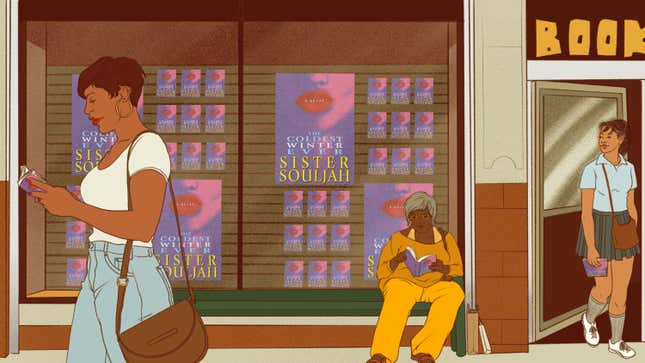
I wanted to tell you a great story about the first time I read The Coldest Winter Ever. I wanted to tell you who told me about it and which parts they raved about and the exact words that were said to convince me to read it. It could have been my college roommate. Or my Mom. Or even some guy I was dating because in 1999 everyone, and quite literally their mother, was reading Sister Souljah’s debut novel.
But I can’t remember those details. Forgive me. The Coldest Winter Ever was released 22 years ago.
I can tell you, however, where my two-decades old copy of the book is: on my color-coded bookshelf. It sits between bell hooks’s All About Love and Bassey Ikpi’s I’m Telling the Truth But I’m Lying. It is a first-edition paperback with pages that have yellowed from age, and the spine is well-worn from multiple reads. It has survived seven moves between three states, five apartments and one house (twice). It passed muster during my “fuck everything” phase when I left Brooklyn for Washington, D.C. with half my sanity and ten percent of my stuff, and my YOLO phase when I moved 2,300 miles across country just because I could. I left a lot behind (again), culling my book collection using the following criteria: 1) did it have some impact on my life?; 2) might I possibly read it again?; and 3) when people inevitably visit my home, and make their assessments about who I am based on my book collection, what do I want the take away to be? (Answer: Demetria is well-balanced).
Here’s what I do remember: I couldn’t put that book down. I recall wanting to throw it across the room over Winter’s….was it delusion or selfishness? Like, your dad is locked up on fed charges, your mother smokes crack, your sisters are wards of the state, you’re homeless and your foremost concern is what to wear and getting your hair done. Girl, whet?! There was that weird way Sister Souljah wrote herself into the story (beginning with the first line). Oh, and Winter’s thirsty desperation for Midnight and his utter lack of interest. It was the first time I had second-hand embarrassment reading a book.
Winter’s story, according to Souljah in various interviews (including one for my podcast), was written as a morality play, a modern-day update to the 15th century theatre genre. Souljah was a nationally known community organizer who was outspoken about racism and had held her own in a showdown with then-presidential candidate Bill Clinton. She was looking for a new way to get her messages across and relied on an old skill. She wrote a story to highlight the ways drugs ravaged urban communities and Winter’s downfall was supposed to be an example of what happens to young women who are consumed with materialism and mindless sex.
But instead of being repulsed by Winter, readers rooted not just for her survival, but for her to establish her own crime family. We were mad at every friend who abandoned her, every guy who played her, and anyone – even Souljah—who got in the way of Winter’s progress. We rooted for Winter to get revenge. We ignored her homophobia. We flipped the pages well into the night, seduced by the whirlwind of drama, graphic sex and Winter’s constant scheming with mixed results. (Winter was smart enough to survive, but thriving eluded her.)
Souljah, who began writing in high school, might have written Winter ‘too well’, if there can be such a thing. Readers knew everything from Winter’s favorite designer clothing to her preferred drink to the length of her pubic hair. We knew her guilt for having sex with her father’s rival, and her lack of it when she sold crack to her mother. We felt her terror when the simp dude kicked her out on the street and when the fly dude used snarling dogs to trap her in the bedroom. The depiction of a teenage ghetto superstar was perceived to be so on the cliched nose that some folks thought The Coldest Winter Ever was Souljah’s second memoir. It wasn’t.
The result? The Coldest Winter Ever sold over 1 million copies. A book went platinum. Not an unheard of feat, but an extraordinarily rare one, particularly when authors had to rely on word-of-mouth reviews instead of social media marketing. It was a New York Times, Los Angeles Times, and USA Today best seller. PBS nominated it as the one of America’s best-loved novels. Essence called it one of the “50 Most Impactful Black Books of the Last 50 Years.” The success of The Coldest Winter Ever gave credence to “urban fiction,” a then-emerging and still-controversial literary genre. And it primed audiences for no-nonsense (but way smarter) TV characters, such as Empire’s “Cookie Lyon”, Power’s “Tasha St. Patrick”, The Wire’s “Delonda Brice” and Snowfall’s “Aunt Louie”.
Souljah went on to write five more books about characters introduced in The Coldest Winter Ever, including a meaty, three-part series about Midnight. For more than 22 years, fans have amused themselves guessing who would star in a potential film based on the bestselling book. It never gets old. (For years, I was rooting for Lauren London. Now I want Chloe Bailey or Ryan Destiny.) In 2008, hope was on the horizon. Jada Pinkett-Smith, who optioned the book rights, told Vibe Magazine that an HBO film was maybe, kind of possible, but obviously that didn’t happen. Earlier this year, Souljah told me she had completed a script for the film, which was being shopped. Again.
It took a whole twenty-two years to find out what happened to Winter after she was arrested and jailed at the end of The Coldest Winter Ever. Life After Death: A Novel, the official sequel, was released earlier this year. It debuted on The New York Times’ bestseller list. In two categories.
Winter Santiaga lives on.

